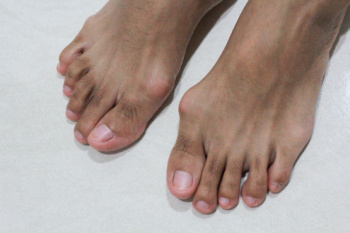Connect With Us
Blog

Wearing high heels for extended periods of time can lead to foot swelling due to the unnatural position they force on the feet. High heels shift body weight forward onto the balls of the feet, placing excessive pressure on the forefoot and toes. This uneven distribution of weight can restrict blood flow and cause fluid to accumulate in the lower extremities. The lack of proper arch support and narrow toe boxes in many high heels can also compress nerves and blood vessels, further contributing to swelling and discomfort. Over time, this pressure can lead to inflammation, pain, and even more serious foot conditions. Choosing footwear with better support, cushioning, and a lower heel can help reduce swelling and protect long-term foot health while still allowing for stylish options. If you have foot pain from wearing high heels, it is suggested that you contact a podiatrist who can treat various foot conditions, and guide you on appropriate heel selections.
High heels have a history of causing foot and ankle problems. If you have any concerns about your feet or ankles, contact Scott Amoss, DPM from Advanced Foot & Ankle Specialists. our doctor can provide the care you need to keep you pain-free and on your feet.
Effects of High Heels on the Feet
High heels are popular shoes among women because of their many styles and societal appeal. Despite this, high heels can still cause many health problems if worn too frequently.
Which Parts of My Body Will Be Affected by High Heels?
- Ankle Joints
- Achilles Tendon – May shorten and stiffen with prolonged wear
- Balls of the Feet
- Knees – Heels cause the knees to bend constantly, creating stress on them
- Back – They decrease the spine’s ability to absorb shock, which may lead to back pain. The vertebrae of the lower back may compress.
What Kinds of Foot Problems Can Develop from Wearing High Heels?
- Corns
- Calluses
- Hammertoe
- Bunions
- Morton’s Neuroma
- Plantar Fasciitis
How Can I Still Wear High Heels and Maintain Foot Health?
If you want to wear high heeled shoes, make sure that you are not wearing them every day, as this will help prevent long term physical problems. Try wearing thicker heels as opposed to stilettos to distribute weight more evenly across the feet. Always make sure you are wearing the proper shoes for the right occasion, such as sneakers for exercising. If you walk to work, try carrying your heels with you and changing into them once you arrive at work. Adding inserts to your heels can help cushion your feet and absorb shock. Full foot inserts or metatarsal pads are available.
If you have any questions please feel free to contact our offices located in Whiting and Toms River, NJ . We offer the newest diagnostic and treatment technologies for all your foot and ankle needs.

A bunion is more than a bump on the side of the foot. It is a misalignment of the joint at the base of the big toe, which can lead to swelling, redness, and persistent pain. Bunions often develop slowly and may be caused by inherited foot structure, arthritis, or wearing tight shoes that crowd the toes. Early treatment focuses on relieving discomfort and slowing the progression of the deformity. Wearing shoes with a wide toe box and using protective pads can reduce pressure and inflammation. Custom orthotics may help correct foot mechanics and ease strain on the joint. In cases where pain interferes with daily activities, surgical options may be considered to realign the toe and restore function. If you are struggling with bunion pain or notice the deformity is worsening, it is suggested that you see a podiatrist for a proper diagnosis and treatment tailored to your needs.
If you are suffering from bunion pain, contact Scott Amoss, DPM of Advanced Foot & Ankle Specialists. our doctor can provide the care you need to keep you pain-free and on your feet.
What Is a Bunion?
Bunions are painful bony bumps that usually develop on the inside of the foot at the joint of the big toe. As the deformity increases over time, it may become painful to walk and wear shoes. Women are more likely to exacerbate existing bunions since they often wear tight, narrow shoes that shift their toes together. Bunion pain can be relieved by wearing wider shoes with enough room for the toes.
Causes
- Genetics – some people inherit feet that are more prone to bunion development
- Inflammatory Conditions - rheumatoid arthritis and polio may cause bunion development
Symptoms
- Redness and inflammation
- Pain and tenderness
- Callus or corns on the bump
- Restricted motion in the big toe
In order to diagnose your bunion, your podiatrist may ask about your medical history, symptoms, and general health. Your doctor might also order an x-ray to take a closer look at your feet. Nonsurgical treatment options include orthotics, padding, icing, changes in footwear, and medication. If nonsurgical treatments don’t alleviate your bunion pain, surgery may be necessary.
If you have any questions, please feel free to contact our offices located in Whiting and Toms River, NJ . We offer the newest diagnostic and treatment technologies for all your foot care needs.

Heel pain is one of the most common foot complaints, and it can make every step feel like a struggle. Whether it is plantar fasciitis, Achilles tendonitis, or a heel spur, ignoring the pain usually makes things worse. The good news is that most heel pain can be relieved with the right treatment. A podiatrist can pinpoint the cause of your discomfort and create a personalized plan to get you back on your feet. Treatment options often include stretching exercises, custom orthotics, or, in some cases, minimally invasive procedures. Addressing heel pain early helps prevent long-term issues and keeps you active. If heel pain is affecting your daily life, it is suggested that you schedule an appointment with a podiatrist for a proper evaluation, diagnosis, and appropriate treatment.
Many people suffer from bouts of heel pain. For more information, contact Scott Amoss, DPM of Advanced Foot & Ankle Specialists. our doctor can provide the care you need to keep you pain-free and on your feet.
Causes of Heel Pain
Heel pain is often associated with plantar fasciitis. The plantar fascia is a band of tissues that extends along the bottom of the foot. A rip or tear in this ligament can cause inflammation of the tissue.
Achilles tendonitis is another cause of heel pain. Inflammation of the Achilles tendon will cause pain from fractures and muscle tearing. Lack of flexibility is also another symptom.
Heel spurs are another cause of pain. When the tissues of the plantar fascia undergo a great deal of stress, it can lead to ligament separation from the heel bone, causing heel spurs.
Why Might Heel Pain Occur?
- Wearing ill-fitting shoes
- Wearing non-supportive shoes
- Weight change
- Excessive running
Treatments
Heel pain should be treated as soon as possible for immediate results. Keeping your feet in a stress-free environment will help. If you suffer from Achilles tendonitis or plantar fasciitis, applying ice will reduce the swelling. Stretching before an exercise like running will help the muscles. Using all these tips will help make heel pain a condition of the past.
If you have any questions please contact our offices located in Whiting and Toms River, NJ . We offer the newest diagnostic and treatment technologies for all your foot and ankle needs.

If you wake up and feel a sharp pain in your heel when you take your first steps, you are not alone. This is one of the telltale signs of plantar fasciitis, a common cause of heel pain. But why does it hurt most in the morning? While you sleep, your foot relaxes and the plantar fascia, a thick band of tissue running along the bottom of your foot, tightens. When you stand up, the tissue stretches suddenly, causing pain. Plantar fasciitis can happen to anyone, but it is especially common if you spend a lot of time on your feet, have flat feet or high arches, or wear shoes that lack adequate support. The good news is that early treatment can make a big difference. Simple stretches, better footwear, and custom orthotics can help. If heel pain is slowing you down, it is suggested that you see a podiatrist for a proper diagnosis and appropriate treatment.
Plantar fasciitis can be very painful and inconvenient. If you are experiencing heel pain or symptoms of plantar fasciitis, contact Scott Amoss, DPM from Advanced Foot & Ankle Specialists. our doctor can provide the care you need to keep you pain-free and on your feet.
What Is Plantar Fasciitis?
Plantar fasciitis is the inflammation of the thick band of tissue that runs along the bottom of your foot, known as the plantar fascia, and causes mild to severe heel pain.
What Causes Plantar Fasciitis?
- Excessive running
- Non-supportive shoes
- Overpronation
- Repeated stretching and tearing of the plantar fascia
How Can It Be Treated?
- Conservative measures – anti-inflammatories, ice packs, stretching exercises, physical therapy, orthotic devices
- Shockwave therapy – sound waves are sent to the affected area to facilitate healing and are usually used for chronic cases of plantar fasciitis
- Surgery – usually only used as a last resort when all else fails. The plantar fascia can be surgically detached from the heel
While very treatable, plantar fasciitis is definitely not something that should be ignored. Especially in severe cases, speaking to your doctor right away is highly recommended to avoid complications and severe heel pain. Your podiatrist can work with you to provide the appropriate treatment options tailored to your condition.
If you have any questions please feel free to contact our offices located in Whiting and Toms River, NJ . We offer the newest diagnostic and treatment technologies for all your foot and ankle needs.
